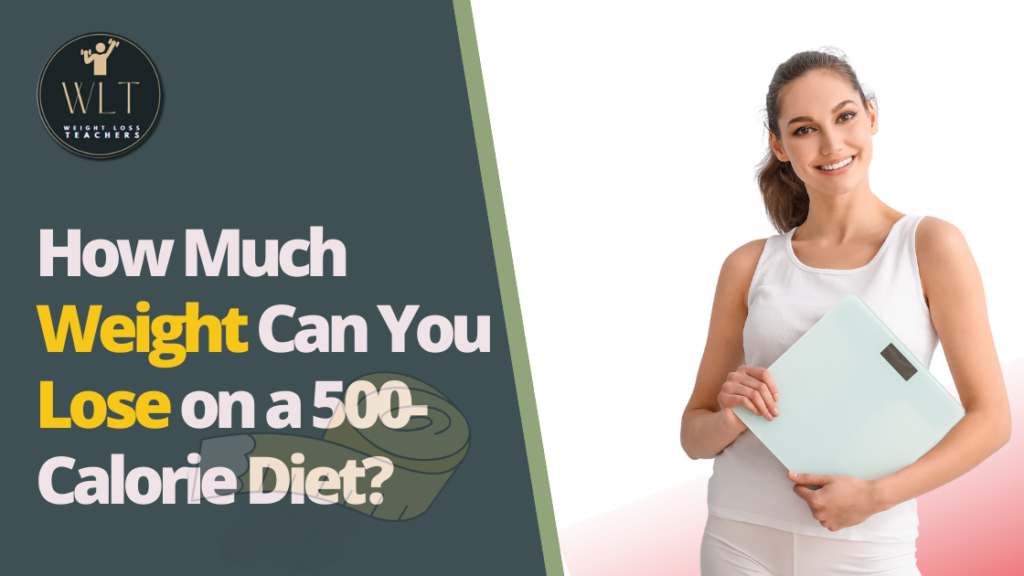
How Much Weight Can You Lose on a 500-Calorie Diet?

Maintaining a healthy weight is a goal for many individuals, and weight loss diets are frequently pursued to achieve this objective. One such diet that has gained popularity is the 500-calorie diet.
Table of Contents
How Much Weight Can You Lose on a 500-Calorie Diet?
This article delves into the details of the 500-calorie diet, exploring its effectiveness, potential risks, and shedding light on how much weight one can expect to lose while following this regimen. It is important to note that any dietary changes should be approached with caution and consultation with a healthcare professional is highly recommended.
Understanding the 500-Calorie Diet

The 500-calorie diet, also known as a very low-calorie diet (VLCD), is a restricted eating plan that significantly reduces daily caloric intake. Typically, the diet allows individuals to consume only 500 calories per day, which is substantially lower than the average recommended daily caloric intake for adults. This drastic reduction aims to create a calorie deficit, forcing the body to utilize stored fat as an energy source, ultimately leading to weight loss.
Mechanisms of Weight Loss on a 500-Calorie Diet

On a 500-calorie diet, weight loss primarily occurs due to the calorie deficit created. When the body is not provided with enough calories to meet its energy requirements, it turns to stored fat as a source of fuel. This leads to the breakdown of fat cells and subsequent weight loss. However, it is important to consider that the initial weight loss may include water weight and muscle mass alongside fat loss.
Factors Affecting Weight Loss on a 500-Calorie Diet

The amount of weight an individual can lose on a 500-calorie diet varies depending on several factors. These include:
- Basal Metabolic Rate (BMR): BMR is the number of calories the body requires to maintain basic bodily functions at rest. Individuals with a higher BMR may lose weight at a faster rate on a 500-calorie diet.
- Gender and Age: Men generally have a higher BMR than women, meaning they may experience faster weight loss. Additionally, younger individuals tend to have higher metabolic rates compared to older individuals.
- Starting Weight: People with a higher starting weight may initially lose weight more quickly on a 500-calorie diet due to a larger calorie deficit.
- Physical Activity: Engaging in regular physical activity, even at a low intensity, can aid in weight loss. However, on a 500-calorie diet, it is crucial to ensure that exercise is safe and does not lead to excessive calorie expenditure.
Expected Weight Loss on a 500-Calorie Diet

The rate at which weight is lost on a 500-calorie diet can vary, but it is generally considered an aggressive approach to weight loss. A reasonable estimate is to expect a weekly weight loss of 1-2 pounds. However, this figure may differ depending on individual factors such as those mentioned earlier. It is important to note that losing weight too rapidly can have negative effects on overall health and may not be sustainable in the long term.
Potential Risks and Side Effects

While the 500-calorie diet may lead to weight loss, it is crucial to understand the potential risks and side effects associated with such a low-calorie regimen. These risks include:
- Nutritional Deficiencies: Severely restricting caloric intake can make it challenging to meet the body’s nutritional needs, leading to deficiencies in essential vitamins, minerals, and macronutrients.
- Muscle Loss: Rapid weight loss, especially without exercise, may result in the loss of muscle mass. When the body is not receiving enough calories, it may break down muscle tissue to meet its energy demands. This can have negative implications for overall strength, metabolism, and body composition.
- Fatigue and Weakness: Consuming only 500 calories per day can lead to feelings of fatigue, weakness, and a lack of energy. The body requires a certain amount of fuel to function optimally, and severely restricting calories can leave individuals feeling lethargic and drained.
- Slowed Metabolism: Prolonged calorie restriction can slow down the metabolism as the body adapts to the lower energy intake. This can make it more difficult to lose weight in the long run and may result in weight regain once normal eating patterns are resumed.
- Nutritional Imbalances: A 500-calorie diet often lacks the necessary variety and quantity of foods to provide adequate nutrition. This can lead to imbalances in macronutrients, such as insufficient protein intake, or deficiencies in essential vitamins and minerals, which are vital for overall health and well-being.
Sustainability and Long-Term Considerations

While the 500-calorie diet may produce initial weight loss, its long-term sustainability is questionable. Such a low-calorie intake is difficult to maintain over an extended period, leading to potential feelings of deprivation, food cravings, and a higher likelihood of binging or returning to previous eating habits. Long-term success in weight management requires a balanced and sustainable approach that incorporates regular physical activity, a variety of nutritious foods, and a healthy relationship with food.
Seeking Professional Guidance

Before embarking on any weight loss journey, especially one as restrictive as the 500-calorie diet, it is crucial to consult with a healthcare professional or a registered dietitian. They can assess an individual’s unique circumstances, provide personalized guidance, and monitor overall health and well-being during the weight loss process.
Conclusion
In conclusion, the 500-calorie diet can lead to weight loss due to the significant calorie deficit it creates. However, it is crucial to approach this diet with caution and awareness of the potential risks and side effects associated with such a low-calorie intake. Nutritional deficiencies, muscle loss, fatigue, and a slowed metabolism are among the potential risks. Sustainable weight loss requires a balanced and long-term approach that prioritizes overall health and well-being.
Before embarking on any weight loss journey, it is advisable to consult with a healthcare professional or a registered dietitian. They can provide personalized guidance, monitor your progress, and ensure that your weight loss approach aligns with your specific needs and circumstances. Remember, the goal is to achieve and maintain a healthy weight in a safe and sustainable manner.
By understanding the mechanisms, potential risks, and considering long-term sustainability, individuals can make informed decisions about their weight loss journey. Focus on adopting a balanced diet, regular physical activity, and seeking professional guidance to achieve your weight loss goals effectively and safely.
Disclaimer: The information provided in this article is for educational purposes only and should not be considered as a substitute for medical advice. Consult a healthcare professional before implementing any home remedies or making significant changes to your lifestyle.






